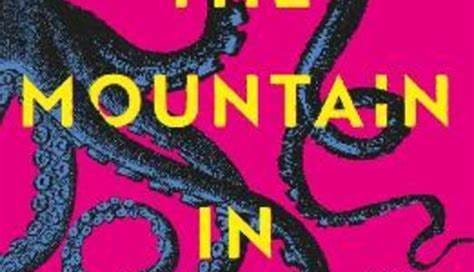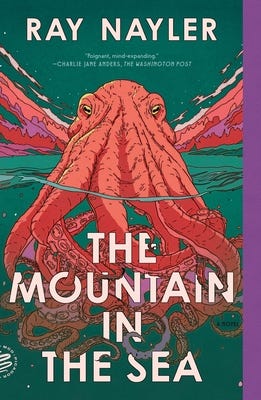It isn’t often that the cover for a book makes me stop, and it isn’t often that I even buy anything new from a big corporate book store like Barnes and Noble anyway, but I was wandering around the fantasy section when I saw Ray Nayler’s octopus novel facing out, and I grabbed it, thinking I could get a laugh from reading the back cover. I assumed that it was some “New Weird” attempt at rewriting Lovecraft’s classic but brutally over-referenced and ripped off “The Call of Cthulhu”, but for something like that, it was stunningly understated. Promising a story about a newly discovered species of octopus with a written language, there wasn’t even a hint of eldritch, unknowable beasties from beyond the stars. Maybe Cthulhu and his ilk are finally seen as passe by the normies of the world.
All that is to say that this book, despite seemingly framing the octopus on its cover against two mountains, suggesting wings, has zero pretensions about being a modern “The Call of Cthulhu”, with biologists in place of the racist investigator of the original. Instead, it is a hard sci-fi look at what encountering another species that can demonstrate sentience might look like.
It is also concerned with the concept of consciousness, making it a major theme as it presents different examples of what we think of consciousness; there is an automated slave ship, which patrols the desolate waters, compelling its crew to trawl the water for protein. An uprising where the workers slaughter the guards does little to ease the suffering of the slaves, as they discover that the AI mind of the ship is impregnable, and they are utterly at its mercy, depending on the AI to dispense food, fresh water, and medicine. A computer hacker muses on what it must be like to be an interconnected system of computers, or even a bat, seeing the world in ways human beings can’t even imagine, while a woman he is seeing introduces him to her own AI partner, a 1.5 hologram, much like Joi from Bladerunner 2047 (1.5 because the simulated person is not designed to be a full partner, just someone to talk to). And finally, on the island of Con Dao, where much of the action takes place, we are introduced to Evrim, a gender-neutral android placed there after his creation set off a political firestorm as mankind did its usual thing, freaking out over basically being shown a mirror to themselves and having their worldview challenged.
For those of you still reading who would most likely love this book and likely want your worldview being challenged, you’ll be pleased to learn that the main character, Ha, a biologist who has dedicated her life to studying octopus psychology, is hellbent on making contact with the cephalopods. Under the watchful eye of Altantsetseg, the guardian on behalf of the island, which is owned by the company that built Evrim, Dianima, Evrim and Ha set about remotely watching the octopi, trying to decipher the symbols they manifest on their skin and musing on the nature of their intellect. Altantsetsegis able to control all of the drones on the island, and she keeps all poachers at bay, destroying their ships, killing with no remorse or hesitation. Her relationship with the drones is similar to how an octopus controls its arms, which seem to act independently of its mind, feeding stimuli back to it as it redirects them.
All that is to say, obviously, that you should read this book. It reminded me more of Speaker For the Dead, Orson Scott Card’s unconventional sequel to Ender’s Game, with its in-depth exploration of an alien society and their baffling, violent actions. It is also a sterling example of not judging a book by its cover, as I was sorely reminded.





